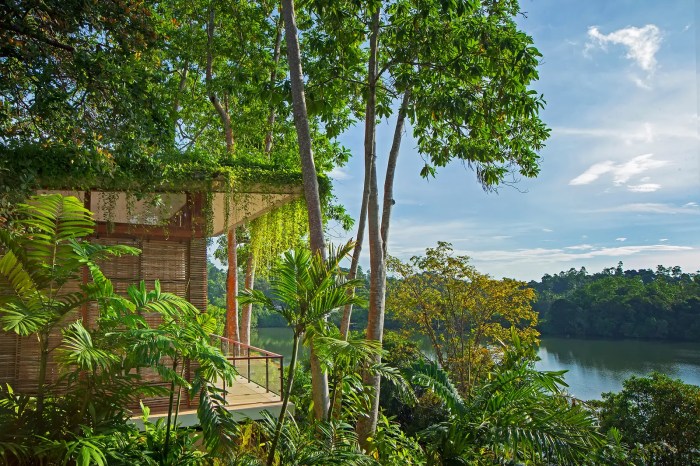Eco-Friendly Hotels A Sustainable Stay
Eco-Friendly Hotels represent a growing sector in the hospitality industry, prioritizing environmental responsibility alongside guest comfort. These hotels go beyond basic amenities, actively implementing sustainable practices to minimize their ecological footprint. From sourcing locally produced food to utilizing renewable energy sources, eco-friendly hotels offer a unique travel experience that aligns with conscious consumerism and a growing awareness of environmental protection.
This exploration delves into the multifaceted aspects of these sustainable accommodations, examining their operational strategies, guest experiences, and the broader impact they have on the environment.
The journey into the world of eco-friendly hotels reveals a commitment to responsible tourism that extends beyond mere marketing. It’s about the conscious choices made at every stage, from construction and procurement to daily operations and guest engagement. We’ll uncover how these hotels are innovating, overcoming challenges, and ultimately contributing to a more sustainable future for the travel industry.
Defining Eco-Friendly Hotels
Eco-friendly hotels, also known as sustainable hotels, are establishments that actively minimize their environmental footprint through conscious operational practices and design choices. They go beyond simply offering recycling bins; they integrate sustainability into every aspect of their business, from energy consumption to waste management and sourcing of materials. This commitment aims to reduce the negative impact on the planet and promote responsible tourism.Eco-friendly hotels are distinguished from traditional hotels by their proactive approach to environmental responsibility.
Unlike traditional hotels that may address environmental concerns reactively or minimally, eco-friendly hotels prioritize sustainability from the initial design phase through to daily operations. This involves a holistic approach encompassing energy efficiency, water conservation, waste reduction, and the use of sustainable materials and products. The commitment is evident in visible practices and often backed by certifications that validate their efforts.
Certification Standards for Eco-Friendly Hotels
Several organizations offer certification programs for eco-friendly hotels, providing a framework for measuring and verifying sustainability practices. These certifications vary in their criteria and rigor, offering consumers a benchmark for identifying genuinely committed hotels. For example, LEED (Leadership in Energy and Environmental Design) is a widely recognized green building certification system that evaluates a building’s environmental performance across various categories, including energy efficiency, water conservation, and materials selection.
Green Globe, another prominent certification, focuses specifically on the tourism industry, offering a comprehensive standard that covers environmental, social, and economic sustainability. While both aim for environmental responsibility, LEED is broader, covering all building types, while Green Globe’s focus is specifically tailored to the hospitality sector. Other certifications exist, each with its own set of requirements and emphasis.
The choice of certification reflects the hotel’s commitment level and the specific areas they prioritize.
Environmental Impacts of Hotels and Mitigation Strategies
Hotels, particularly large ones, have a significant environmental impact due to their high energy and water consumption, waste generation, and reliance on resource-intensive products. For example, a large hotel can consume vast amounts of energy for lighting, heating, cooling, and laundry services. Similarly, water usage for guest rooms, pools, and landscaping can be substantial. Waste generation, including food waste, single-use plastics, and general refuse, is another major concern.
Eco-friendly practices actively mitigate these impacts. Energy-efficient lighting and appliances, water-saving fixtures, and on-site renewable energy sources (like solar panels) reduce resource consumption. Waste reduction programs, including composting and recycling initiatives, minimize landfill contributions. Sourcing locally-produced food and using eco-friendly cleaning products further lessen the environmental burden. The overall aim is to minimize the hotel’s ecological footprint and contribute to a more sustainable tourism industry.
Sustainable Practices in Eco-Friendly Hotels

Source: thehoteljournal.com
Eco-friendly hotels are committed to minimizing their environmental impact through a variety of sustainable practices. These practices go beyond simple green initiatives and represent a holistic approach to responsible tourism, benefiting both the environment and the guest experience. This section will detail several key sustainable practices commonly found in these establishments.
Key Sustainable Practices in Eco-Friendly Hotels
The implementation of sustainable practices is multifaceted, encompassing energy efficiency, water conservation, waste management, and responsible sourcing. These actions collectively contribute to a significantly reduced carbon footprint and a more responsible approach to hospitality.
| Sustainable Practice | Benefits | Implementation Examples | Environmental Impact |
|---|---|---|---|
| Energy Efficiency | Reduced energy consumption, lower operating costs, decreased carbon emissions. | LED lighting, smart thermostats, energy-efficient appliances, solar panels, occupancy sensors. | Significant reduction in greenhouse gas emissions. |
| Water Conservation | Reduced water consumption, lower water bills, preservation of water resources. | Low-flow showerheads and faucets, rainwater harvesting systems, efficient irrigation systems, water-saving toilets. | Conserves precious freshwater resources and reduces strain on local water systems. |
| Waste Management and Recycling | Reduced landfill waste, conservation of resources, potential revenue generation from recycling. | Comprehensive recycling programs, composting food waste, reusable amenities, reduction of single-use plastics. | Minimizes environmental pollution and conserves natural resources. |
| Sustainable Sourcing | Supports local economies, reduces transportation emissions, promotes ethical and environmentally responsible practices. | Sourcing food from local farms, using locally produced cleaning supplies, partnering with eco-conscious suppliers. | Reduces carbon footprint associated with transportation and supports sustainable agriculture. |
| Carbon Offsetting | Neutralizes the unavoidable carbon emissions, contributes to environmental projects. | Investing in renewable energy projects, supporting carbon offsetting programs, planting trees. | Reduces overall carbon footprint and supports environmental restoration. |
Energy-Efficient Technologies in Eco-Friendly Hotels
Eco-friendly hotels frequently incorporate advanced technologies to minimize energy consumption. This commitment to innovation contributes to significant reductions in their environmental footprint and operational costs.Examples include the widespread adoption of LED lighting, known for its energy efficiency and long lifespan. Smart thermostats learn occupancy patterns to optimize heating and cooling, reducing wasted energy. Solar panels are increasingly common, providing renewable energy sources to power hotel operations.
Building management systems (BMS) monitor and control energy usage across the entire hotel, identifying areas for improvement and maximizing efficiency. Finally, occupancy sensors automatically switch off lights and appliances in unoccupied rooms, further reducing energy waste.
Water Conservation Strategies in Eco-Friendly Hotels
Water conservation is another crucial aspect of sustainable hotel operations. Hotels employ various strategies to minimize water usage without compromising guest comfort.These strategies often involve installing low-flow showerheads and faucets, reducing water flow without sacrificing water pressure. Rainwater harvesting systems collect rainwater for non-potable uses like irrigation, reducing reliance on municipal water supplies. Efficient irrigation systems optimize water usage in landscaping, minimizing water waste.
Hotels also increasingly utilize water-saving toilets and appliances, significantly reducing overall water consumption. Furthermore, staff training programs educate employees on water-saving practices, promoting a culture of conservation throughout the hotel.
Waste Management and Recycling Programs in Eco-Friendly Hotels
Effective waste management and recycling programs are essential for minimizing a hotel’s environmental impact. These programs aim to divert waste from landfills and promote resource conservation.Many eco-friendly hotels implement comprehensive recycling programs, separating various recyclable materials like paper, plastic, glass, and metal. Food waste is often composted, reducing landfill waste and creating valuable compost for landscaping. Hotels are actively reducing their reliance on single-use plastics, replacing them with reusable alternatives.
They also promote the use of reusable amenities, such as bath products and linens, reducing waste generation. Finally, many hotels partner with local recycling facilities and waste management companies to ensure efficient and responsible waste disposal.
Sourcing and Procurement in Eco-Friendly Hotels
Eco-friendly hotels prioritize sustainable sourcing and procurement practices across all aspects of their operations, from the food served to the building materials used. This commitment extends beyond simply reducing environmental impact; it often enhances the guest experience and supports local communities. Strategic sourcing is a cornerstone of a truly sustainable hotel.
Sustainable Food and Beverage Sourcing Strategies
Eco-friendly hotels employ various strategies to ensure their food and beverage offerings align with their sustainability goals. A key focus is sourcing locally produced, seasonal ingredients. This reduces transportation emissions, supports local farmers, and often results in fresher, higher-quality products. Many hotels also prioritize organic farming practices, minimizing the use of pesticides and herbicides. Fair Trade certifications are sought out to guarantee ethical treatment of workers in the supply chain.
Finally, reducing food waste is a significant aspect, often involving meticulous inventory management, creative menu planning, and composting programs. For example, a hotel might partner with a nearby organic farm to source produce, ensuring freshness while minimizing the carbon footprint associated with long-distance transportation. They might also implement a “farm-to-table” dining concept, showcasing the local ingredients used in their dishes.
Criteria for Selecting Eco-Friendly Suppliers
The selection of eco-friendly suppliers for amenities and other products involves a rigorous evaluation process. Hotels often prioritize suppliers who demonstrate a commitment to sustainable practices, such as using recycled materials, minimizing packaging, and adhering to fair labor standards. Certifications like Fair Trade, B Corp, and LEED are valuable indicators of a supplier’s environmental and social responsibility. Transparency in the supply chain is also crucial, allowing hotels to trace the origin of their products and ensure ethical sourcing.
For instance, a hotel might choose a supplier of toiletries that uses recycled packaging and plant-based ingredients, rather than a supplier that uses excessive plastic packaging and non-renewable resources. They might also favor suppliers who are locally based to reduce transportation costs and emissions.
Importance of Locally Sourced Materials in Construction and Operations
Using locally sourced materials in construction and operations offers numerous benefits. It reduces transportation distances and associated emissions, supporting local economies and creating jobs. Locally sourced materials often have lower embodied energy – the energy used to extract, process, and transport them – compared to materials transported over long distances. This contributes to a smaller carbon footprint for the hotel’s construction and ongoing operations.
For example, a hotel might use locally harvested timber for its construction, reducing the need for materials transported from far-off regions. They might also source locally produced cleaning products, minimizing packaging and transportation impacts.
Cost-Effectiveness of Sustainable versus Non-Sustainable Products
While the initial investment in sustainable products might be higher in some cases, the long-term cost-effectiveness often outweighs the initial expense. Reduced waste management costs, lower energy consumption due to energy-efficient products, and potentially increased customer loyalty due to the hotel’s commitment to sustainability can contribute to significant cost savings over time. Moreover, the positive public image and brand reputation associated with sustainability can attract more environmentally conscious guests, leading to increased occupancy and revenue.
For instance, using energy-efficient lighting and appliances can lead to substantial savings on electricity bills over the lifetime of the equipment. Similarly, reducing water consumption through efficient fixtures can lower water and sewage bills.
Guest Experience and Eco-Friendly Initiatives

Source: vogue.com
Creating a positive guest experience while upholding eco-friendly practices is crucial for eco-friendly hotels. It’s about seamlessly integrating sustainability into every aspect of a guest’s stay, making it not just an environmentally conscious choice, but also a genuinely enjoyable one. This involves thoughtful design, engaging activities, and transparent communication about the hotel’s sustainability efforts.
Guest Information Pamphlet: Eco-Friendly Initiatives, Eco-Friendly Hotels
This pamphlet provides a concise overview of the hotel’s commitment to sustainability. It aims to inform guests about the initiatives in place and encourage their participation.
Our hotel is committed to minimizing our environmental footprint and creating a sustainable future. We invite you to join us in this journey by embracing our eco-friendly practices.
By choosing to stay with us, you are directly supporting our efforts to protect our planet.
The pamphlet would include sections on:
- Water Conservation: Details on low-flow showerheads, water-saving toilets, and encouraging guests to reuse towels.
- Energy Efficiency: Information about energy-efficient lighting, smart thermostats, and requests to turn off lights and appliances when leaving the room.
- Waste Reduction: Explanation of recycling programs, composting initiatives, and the reduction of single-use plastics.
- Sustainable Sourcing: Highlighting the use of locally sourced food and amenities, and the sourcing of sustainable materials for construction and furnishings.
- Carbon Footprint Reduction: Discussion of initiatives like carbon offsetting programs or investments in renewable energy.
Engaging Activities Promoting Environmental Awareness
Providing engaging activities encourages guest participation in the hotel’s sustainability efforts and fosters a deeper understanding of environmental issues.
Examples of such activities include:
- Guided nature walks or hikes: Exploring local flora and fauna, highlighting the importance of biodiversity.
- Workshops on sustainable living: Sharing practical tips and tricks for reducing one’s environmental impact at home.
- Beach or park clean-up initiatives: Guests can actively contribute to the preservation of local ecosystems.
- Educational presentations on local conservation efforts: Showcasing the work of local organizations dedicated to environmental protection.
- Seed planting or tree planting activities: Directly participating in reforestation or habitat restoration projects.
Educating Guests About Sustainability
Eco-friendly hotels employ various methods to educate guests about sustainability. This goes beyond simply providing information; it aims to inspire behavioral change.
Examples of educational methods include:
- Interactive displays and signage: Using visually appealing graphics and clear messaging to communicate key information about the hotel’s initiatives.
- In-room information cards: Providing concise details about water and energy conservation tips, along with explanations of the hotel’s sustainable practices.
- Partnering with local environmental organizations: Sharing information about their work and encouraging guests to support their efforts.
- Offering educational materials in guest rooms: Providing brochures, pamphlets, or even short videos about local environmental issues and conservation efforts.
- Integrating sustainability into the hotel’s storytelling: Highlighting the hotel’s commitment to sustainability in its marketing materials and website.
Sample Eco-Tourism Itinerary
This itinerary focuses on creating a memorable and sustainable travel experience for guests interested in eco-tourism.
A three-day itinerary might include:
- Day 1: Arrival at the eco-friendly hotel, followed by a guided nature walk showcasing local flora and fauna. Evening: Presentation on local conservation efforts.
- Day 2: Participation in a beach or park clean-up initiative. Afternoon: Workshop on sustainable living, followed by a locally sourced farm-to-table dinner.
- Day 3: Visit to a nearby national park or nature reserve. Afternoon: Relaxation at the hotel, reflecting on the sustainable travel experience.
Marketing and Communication Strategies for Eco-Friendly Hotels
Marketing an eco-friendly hotel requires a nuanced approach that resonates with environmentally conscious travelers while also attracting a broader audience. It’s about showcasing the hotel’s commitment to sustainability not just as a selling point, but as an integral part of the overall guest experience. This involves crafting a compelling narrative that highlights both the environmental benefits and the luxurious comfort offered.
A Marketing Campaign Highlighting Sustainability
A successful marketing campaign should emphasize the unique selling proposition of the hotel’s commitment to sustainability. This could involve a multi-faceted approach encompassing digital marketing, public relations, and partnerships with environmental organizations. For instance, a campaign could focus on the hotel’s carbon footprint reduction strategies, highlighting specific achievements like energy savings or water conservation initiatives. The campaign could also feature testimonials from satisfied guests who appreciate the hotel’s eco-friendly practices.
Visuals should prominently display elements like solar panels, lush gardens, and efficient water systems. The campaign’s messaging should be consistent across all platforms, reinforcing the hotel’s brand identity as a leader in sustainable hospitality.
Visually Appealing Brochure Design
The brochure should be designed to be both informative and aesthetically pleasing. The cover could feature a captivating image of the hotel nestled amidst lush greenery, perhaps with a glimpse of solar panels on the roof. Inside, photographs showcasing the hotel’s eco-friendly features should be prominently displayed. For example, one page might depict a vibrant garden providing fresh herbs for the restaurant, while another could show the hotel’s composting system.
Images of recycled materials used in the hotel’s construction or décor, such as reclaimed wood or upcycled furniture, would also be effective. The overall design should be clean, modern, and visually appealing, using earthy tones and natural textures to reinforce the eco-friendly message. Text should be concise and easy to read, highlighting key features and benefits.
Effective Online Marketing Strategies
Targeting environmentally conscious travelers requires a strategic online marketing approach. Search Engine Optimization () is crucial, focusing on s related to “eco-friendly hotels,” “sustainable travel,” and the hotel’s specific location. Paid advertising on platforms like Google Ads and social media can target specific demographics interested in sustainable tourism. Collaborating with travel bloggers and influencers who focus on eco-travel can generate authentic and engaging content.
A strong social media presence, showcasing the hotel’s commitment to sustainability through visually appealing posts and stories, is essential. Utilizing platforms like Instagram and Pinterest, which are visually driven, can be particularly effective in showcasing the hotel’s aesthetic and eco-friendly features. Furthermore, showcasing positive guest reviews that mention the hotel’s sustainability initiatives can build trust and credibility.
Transparent Communication Regarding Sustainability Efforts
Transparency is paramount. The hotel should openly communicate its sustainability efforts, providing detailed information on its website and in marketing materials. This could include a dedicated section detailing the hotel’s environmental policies, energy consumption data, waste reduction strategies, and partnerships with local environmental organizations. Providing verifiable certifications, such as LEED certification or Green Globe certification, further enhances credibility.
Regular updates on sustainability initiatives, such as progress reports or blog posts, demonstrate a continued commitment and build trust with guests. Addressing any concerns or questions about the hotel’s sustainability practices openly and honestly is also crucial for maintaining a positive reputation.
Challenges and Opportunities for Eco-Friendly Hotels
The burgeoning eco-friendly hotel sector faces a unique set of challenges while simultaneously enjoying significant opportunities for growth and innovation. Balancing the financial demands of running a successful business with the often-higher initial investment and operational costs associated with sustainable practices is a constant tightrope walk. However, the increasing consumer demand for ethical and sustainable travel presents a powerful incentive for overcoming these hurdles.
Main Challenges Faced by Eco-Friendly Hotels
Maintaining high standards of sustainability in the face of competing economic pressures is a significant challenge. The upfront costs of implementing green technologies, such as solar panels or water-efficient fixtures, can be substantial. Furthermore, the ongoing operational costs of maintaining these systems and adhering to rigorous sustainability certifications can impact profitability. Educating and motivating staff to consistently follow eco-friendly procedures is also crucial, requiring ongoing training and potentially higher wages to attract and retain dedicated employees.
Finally, accurately measuring and reporting on environmental impact requires robust data collection and analysis systems, adding to operational complexity. For example, a hotel might struggle to accurately track its water usage across different departments, making it difficult to identify areas for improvement.
Opportunities for Growth and Innovation in the Eco-Friendly Hotel Sector
The rising awareness of climate change and the increasing demand for sustainable travel are creating significant opportunities for eco-friendly hotels. Consumers are increasingly willing to pay a premium for accommodations that align with their values, driving demand and justifying the higher initial investment in sustainable infrastructure. Innovation in areas such as renewable energy sources, waste management, and sustainable sourcing presents avenues for differentiation and competitive advantage.
For example, a hotel could differentiate itself by using locally sourced, organic food in its restaurant or partnering with a local community to manage its waste recycling program. This not only reduces environmental impact but also supports local economies.
Technological Advancements Enhancing Sustainability in Hotels
Technological advancements offer significant potential for enhancing sustainability in hotels. Smart building management systems can optimize energy consumption by automatically adjusting lighting, heating, and cooling based on occupancy and weather conditions. IoT sensors can monitor water usage in real-time, allowing for quick identification and resolution of leaks. Renewable energy technologies, such as solar panels and wind turbines, can significantly reduce reliance on fossil fuels.
Advanced wastewater treatment systems can minimize water consumption and pollution. The implementation of these technologies, while initially expensive, often leads to long-term cost savings and enhanced operational efficiency. For instance, a hotel using smart thermostats could see a significant reduction in its energy bills within a year, offsetting the initial investment.
Government Policies and Regulations Supporting Eco-Friendly Hotels
Supportive government policies and regulations are vital for fostering the growth of eco-friendly hotels. Tax incentives, grants, and subsidies can make the initial investment in green technologies more affordable. Stringent environmental regulations can level the playing field by requiring all hotels to meet minimum sustainability standards. Certification programs and labeling schemes can help consumers identify truly eco-friendly hotels, increasing transparency and consumer trust.
Examples of such support include tax breaks for renewable energy installations or government-backed loan programs for energy efficiency upgrades. These policies can create a more favorable environment for the adoption of sustainable practices and incentivize investment in the sector.
Summary
In conclusion, eco-friendly hotels showcase a powerful blend of responsible business practices and exceptional guest experiences. By prioritizing sustainability in every aspect of their operations, these hotels demonstrate that environmental consciousness and hospitality can coexist harmoniously. Their commitment to reducing their carbon footprint, conserving resources, and supporting local communities offers a compelling model for the future of the travel industry, encouraging both travelers and businesses to embrace a more sustainable approach.
The success of eco-friendly hotels lies not only in their commitment to environmental responsibility but also in their ability to provide memorable and enriching experiences for their guests, proving that sustainability and luxury can coexist seamlessly.
Question & Answer Hub
What certifications indicate a truly eco-friendly hotel?
Several certifications, like LEED, Green Globe, and others, signify a hotel’s commitment to sustainability. Look for these certifications to verify their claims.
Are eco-friendly hotels more expensive than traditional hotels?
Prices vary, but some eco-friendly hotels may be slightly more expensive due to their investments in sustainable technologies and practices. However, many offer comparable rates.
What if I don’t see obvious eco-friendly features in a hotel?
Many eco-friendly practices are behind the scenes (e.g., water reclamation). Check the hotel’s website or contact them directly to inquire about their sustainability initiatives.
How can I contribute to a hotel’s sustainability efforts during my stay?
Reuse towels, minimize water usage, participate in recycling programs, and choose to eat locally sourced meals when available.
Do eco-friendly hotels compromise on comfort or luxury?
Absolutely not! Many eco-friendly hotels offer luxurious accommodations while prioritizing sustainability. The two are not mutually exclusive.







